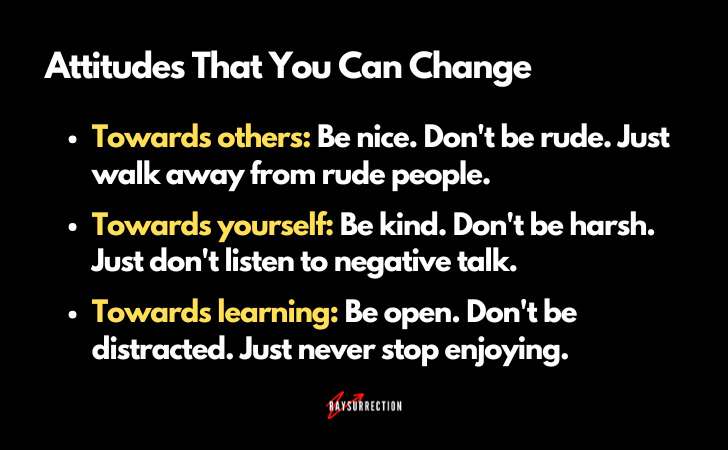Attitudes That You Can Change
Towards others: Be nice. Don't be rude. Just walk away from rude people.
Towards yourself: Be kind. Don't be harsh. Just don't listen to negative talk.
Towards learning: Be open. Don't be distracted. Just never stop enjoying.
Our outlook can shape the way we deal with people, view ourselves, and approach learning. While some attitudes come naturally, others may require a shift to bring about better results.
Changing perspectives isn't always easy, but the rewards are undeniable. Below, we'll explore specific attitudes you can adjust in three areas of life with some bold and even quirky ideas.
1. Towards Others: A New Way to Interact
The way you treat others sets the tone for many interactions, yet shifting your perspective here can transform difficult situations into manageable ones. How you respond to rudeness, kindness, or indifference shapes not only relationships but also your peace of mind.
- Consider rude behavior as a reflection of the other person’s struggles. If someone is unkind, remind yourself that their actions often stem from their own issues. By imagining them wearing oversized clown shoes, you might find it easier to take their words less seriously.
- Turn irritation into an opportunity to learn. If someone annoys you, ask yourself, "What motivates them to act this way?" Viewing their behavior as a puzzle to solve can turn frustration into curiosity.
- Transform compliments into an entertaining challenge. Make it a point to offer unusual and specific praises, such as, "You’ve mastered the art of tying shoelaces!" These quirky acknowledgments can surprise people in a positive way.
- Exit negative interactions with theatrical flair. If a conversation takes a nasty turn, leave calmly but dramatically, like pretending to adjust an invisible royal cape. This approach can defuse tension without escalating conflict.
What kind of interactions frustrate you most? If you approached these situations differently, would you feel calmer or more empowered? Reflecting on these possibilities might shift how you handle challenging relationships.
2. Towards Yourself: Taming the Inner Critic
How you speak to yourself shapes your confidence and daily experience. Adjusting self-directed attitudes isn’t about perfection—it’s about making deliberate, playful changes.
- Respond to self-criticism with exaggerated compliments. When you think, "I’m terrible at this," counter it by saying, "I’m a misunderstood genius in the making!" By flipping negativity into humor, you can lighten your mood.
- Frame your mistakes as amusing trivia. If you mess up, imagine it as part of your personal trivia collection. For example, turning "I spilled coffee on my shirt" into "I’m an avant-garde fashion designer!" can make mistakes feel less serious.
- Speak to yourself as you would a close friend. Imagine a younger version of yourself and offer kind, encouraging words. Saying, "You’re learning; let’s try again," can replace self-blame with a constructive mindset.
- Embrace your quirks by treating life like a sitcom. If you trip on the sidewalk, imagine it’s part of a comedic storyline. Laughing at your clumsy moments can make them feel lighter and less frustrating.
What does your inner voice sound like when things go wrong? If you chose to respond with humor or kindness, would it change your confidence or outlook? Experimenting with these shifts might lead to surprising results.
3. Towards Learning: Staying Curious
Adjusting your attitude toward learning doesn’t require formal education. It’s about finding new ways to enjoy the process of discovery and staying interested in the world around you.
- Use distractions as rewards instead of obstacles. If staying focused feels hard, make deals with yourself. For instance, after reading five pages of a book, watch a short video or snack on your favorite treat.
- Treat every topic like a mystery to solve. Instead of approaching subjects as tasks, ask yourself, "Who benefits from this knowledge, and why?" Making learning feel like uncovering secrets can add intrigue.
- Invent strange uses for dull facts. If you’re studying something tedious, imagine applying it in unusual ways. For example, learning about cloud types could inspire a fictional story about sky pirates.
- Start by exploring the weirdest or most surprising detail. Begin with an odd fact or unique perspective about the topic. For instance, in history, dive into bizarre events before tackling broader themes.
Which subjects or topics feel like a chore to you? If you approached them with creativity or humor, could they become more appealing? Testing this method might reveal new ways to enjoy learning.
You can start changing your attitude today - choose playful shifts and bold strategies, and you;ll be able to reshape how you view others, yourself, and learning.
Small, deliberate adjustments paired with creativity can refresh perspectives and bring unexpected rewards. Imagine the possibilities of transforming even the most frustrating moments into opportunities for growth and enjoyment.



